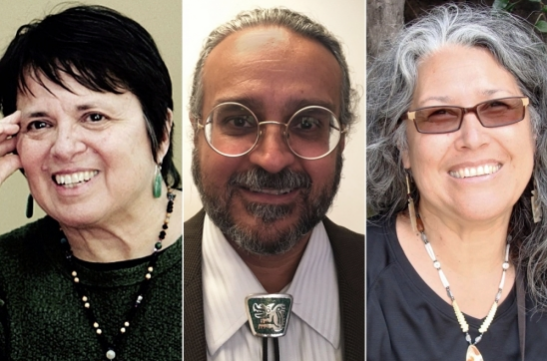UC Santa Barbara, as an official Hispanic-Serving Institution, has long been committed to the needs of its Latino students. Now, three new faculty members in the campus’s English department are taking that support to even higher levels.
Cherríe Moraga, an iconic figure in modern American feminism and a renowned writer on the experience of Chicana lives, has joined the department as professor of English. Also arrived are Ben Olguín, who holds the Robert and Liisa Erickson Presidential Chair in English, and Celia Herrera Rodriguez, an artist who will serve as a lecturer/academic coordinator with shared appointments in the English and Chicano and Chicana studies departments.
For the English department and UCSB, the appointments represent a significant new investment in the teaching of Chicano and Chicana literature. Enda Duffy, professor and department chair, noted that given the ethnic makeup of California and UCSB, where 26 percent of its undergraduates are Latino, it’s vital to have a humanities curriculum that reflects that diversity.
“It’s an expansion of the vision of what any English department in California should be,” Duffy noted. “We are proud of what we have achieved so far — and keen to do much more.”
The Erickson Presidential Chair, which could be the first-ever endowed chair in Chicana literature advertised by a U.S. English department, was made possible by a gift from philanthropists John and Jody Arnhold. Duffy noted that John Arnhold ’75, a UCSB trustee, English alumnus and generous supporter of the campus, said the department could designate the chair in any field deemed appropriate. The faculty voted overwhelmingly for Chicano literature.
“We are so proud to welcome these three outstanding scholars and artists to UC Santa Barbara,” said John Majewski, the Michael Douglas Dean of Humanities and Fine Arts in the College of Letters and Science. “Their innovative and interdisciplinary work — and their commitment to diversity and equal opportunity — will have a major impact in the university, in the classroom and in the community. We are grateful to John and Jody Arnhold for generously funding the Robert and Liisa Erickson Presidential Chair, which provided our superb English Department the chance to bring Ben, Cherríe and Celia to campus.”
In filling the chair, Duffy said, it was important that the hire be the foundation for a robust, long-term Chicano literature program. In addition, the department was determined to find a hands-on scholar, one who would be a mentor and role model. “We searched for someone who would get actively involved and inspire students,” Duffy explained.
Olguín, who came from the University of Texas, is an interdisciplinary scholar of Chicano literature. He is also a published poet. His research and teaching are integrated with service, including projects in community centers and schools in underserved communities. He has worked in prisons, juvenile jails and immigrant detention centers.
Olguín received his Ph.D. from Stanford after graduating from the University of Houston, where his grandfather once worked as a janitor. He has been a professor at Cornell University and, for the past 19 years, at the University of Texas, San Antonio. He said he intends to extend the legacy of UCSB English Professor Carl Gutiérrez-Jones, who spearheaded the teaching of Chicanx literature in the department, and of those for whom the chair is named — English Professor Emeritus Robert Erickson and his wife, Liisa Erickson. The Ericksons were mentors of generations of students, to whom they often opened their home.
“I am always reminded of all the people who did not, and still do not, have the opportunities to attend college, and this motivates me to work to build bridges between the community and the university in everything I do,” Olguín said.
For Moraga and Rodriguez, the opportunity to engage the community figured heavily in their decision to come to UCSB. Moraga, who lectured at Stanford for 20 years, is a renowned playwright, poet and essayist whose works have earned numerous honors. Rodriguez is an artist who lectured on art theory, history and practice at UC Berkeley.
The artistic partners will co-direct Las Maestras Center for Chicana and Indigenous Thought and Art Practice, about to open on campus. Their aim, however, is also to establish an off-campus branch, where they’ll be able to bring their work directly to the community.
The center, they said, would focus on visual, performing and literary arts that aren’t strictly Western-oriented. “Our goal is to create both a place on-campus and off-campus where people can come and participate in that kind of learning practice through a different epistemology, a different way of knowing,” Moraga said. Being in the community, Rodriguez explained, removes the divide between town and gown.
“Cherríe Moraga is one of the most brilliant, original thinkers in Chicano/a literary and feminist/queer critical theory of our generation,” said Executive Vice Chancellor Maria Herrera Sobek. “Bringing her and Celia Herrera Rodriguez to UCSB is a coup for the university. They will certainly put UCSB on the map at multiple levels.”

